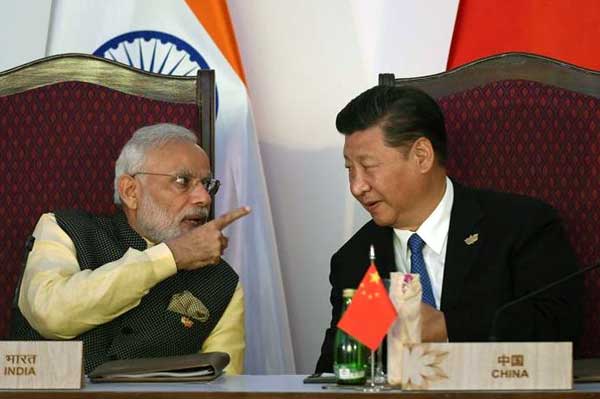 That the 5th Sino-Indian Strategic and Economic Dialogue was held in Beijing despite deep divergences between India and China on strategic and economic issues, and the strains caused after the Doklam standoff in 2017, clearly indicates that both are trying to put relations back on track by increasing engagement at the governmental level.
That the 5th Sino-Indian Strategic and Economic Dialogue was held in Beijing despite deep divergences between India and China on strategic and economic issues, and the strains caused after the Doklam standoff in 2017, clearly indicates that both are trying to put relations back on track by increasing engagement at the governmental level.
Significantly, this dialogue, the first after Doklam, was held days after the Boao Forum, where Chinese President Xi Jinping articulated his vision on a variety of important issues including globalization and geo-politics and the Belt and Road Initiative (BRI).
India was represented at the dialogue by Rajiv Kumar, Vice Chairman Niti (National Institution for Transforming India) Aayog, while China’s representative was He Lifeng, Chairman of China’s National Development and Reform Commission (NDRC)
Apart from bilateral issues – trade, investment, infrastructural cooperation and economic connectivity – the trade dispute between US and China, and possible impact on India-China relations, also figured in the discussions.
India was unequivocal that it would remain neutral in the trade dispute between Beijing and Washington. India suggested to China that it should consider importing soya and sugar from India (China’s imports of agricultural commodities, from the US are around 20 billion USD). Both sides have long been discussing the possibility of China setting up special clusters in India. The Indian delegation said there was great scope for China to set up special clusters in areas like textiles, food processing, electronic components and pharmaceuticals.
Cooperation in infrastructure, particularly the railways, was discussed, specifically to raise the speed of the Chennai-Bangalore railway corridor, and upgrade the Agra and Jhansi railway stations. India also invited China to invest in housing.
However, differences persist on the Belt and Road Initiative (BRI), with China stating that the Bangladesh China India and Myanmar (BCIM) corridor was one of the important corridors. India disagrees, saying the BCIM project precedes the BRI conception. India said it was focused on projects like the Asean Trilateral highway project (India-Myanmar-Thailand), which would bolster its ‘Act East policy.’
There was no progress on Indian concerns over the China Pakistan Economic Corridor, that CPEC passes through disputed territory and is a major sovereignty issue. Commenting on the BRI, at the Boao Forum Xi said, “China has no geopolitical calculations, seeks no exclusionary blocs and imposes no business deals on others.”
The issue of soft power also came up, with India suggesting that, in addition to the current working groups, an additional one be set up on Culture. Indian movies have begun doing well in China, the latest being ‘Hindi Medium.’ Earlier movies like PK, Secret Superstar (Rs.450 crore) and Bajrangi Bhaijaan (Rs.300 crore) had massive collections. Indian filmstar Aamir Khan, one of the producers of both PK and Secret Superstar, has a large number of fans on Chinese social media Sina Weibo and has expressed interest in working with Chinese actors. The success of Bollywood movies in China receives extensive coverage in the Chinese media.
With the US President Donald Trump’s insular economic policies and intransigence on issues like climate change, there is space for India and China to cooperate.
However, China needs to genuinely address Indian concerns on the BRI. In an interview to the South China Morning Post, Indian Ambassador Gautam Bambawale, commenting on India’s apprehensions, said, ” The project should not violate the sovereignty and territorial integrity of a country. Unfortunately, there is this thing called CPEC, which is called a flagship project of BRI, which violates India’s sovereignty and territory integrity. Therefore, we oppose it.”
While India is working jointly with Japan on projects like the Africa Asia Growth Corridor, New Delhi should look at all options. If Japan and China are willing to work jointly on connectivity projects, there is no reason why India should be totally closed to joining parts of the BRI.
Second, in areas like investments, infrastructure and agriculture, it is important to get Indian state governments and Chinese provinces on board by rotation.
The Fourth Strategic Dialogue in October 2016 (India was represented by then Vice Chairman of Niti Aayog, Arvind Panagariya and China by Xu Shaoshi, Chairman of NDRC) witnessed the participation of India’s Coastal Provinces and presentations by them on possible investment opportunities.
While the India-China Forum of State Provincial Leaders has not been able to enhance the participation of states in the bilateral relationship, the Strategic and Economic Dialogue should seek to make Indian states and Chinese Provinces important stakeholders.
Third, while China needs to address India’s concerns and cannot afford to be dismissive of India’s apprehensions, New Delhi needs to move beyond a ‘security’ mindset. Building a constructive economic relationship will be very tough without a degree of flexibility from both ends and will not move beyond platitudes and MOUs. China also needs to deliver on its investment commitments in India ( Xi, during his 2014 visit, had said China would invest 20 billion USD over a five-year period. Official estimates show that till last year, Chinese investments were a little over 1.5 billion USD).
The current geo-political and economic scenario is interesting – albeit challenging and complex – and India should try to harness opportunities as and when they arise. It is also important for both sides to distinguish between short term goals, and a long-term vision – which needs to be more holistic.
Courtesy: http://southasiamonitor.org/news/india-china-must-find-ways-to-cooperate-economically/sl/27049




